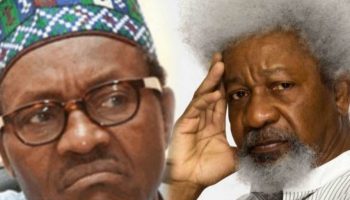
Nobel laureate, Prof. Wole Soyinka has again tackled President Muhammadu Buhari, saying the president is incapable of grasping the complexities of a nation like Nigeria.
In an interview on Friday, Prof. Soyinka described President Buhari as being trapped among other governance derelictions, in the divisive snare of nepotism, and therefore not capable to govern the country.
“He goes so far as to pluck people from retirement for jobs or sensitive positions simply because they are the only people he knows and trusts. The pattern has remained consistent. In the last elections, I urged voters to abandon APC and PDP, since the latter was just as severely lamed, and try and install a fresh mind,” he said.
When asked what the nation could do to solve insecurity problem, Soyinka said whether the nation liked it or not, there was something called national psychology, which everybody did not share.
Soyinka lamented that from that beginning, had now sprung, as he warned, this now transnational industry in Nigeria, saying that to stop it now required the entire co-ordination of efforts across religion, business, rural governments, and the sensitisation of the entire nation towards the exercise of their powers of observation.
The Nobel laureate was also asked at what point the nation got it wrong. He said the nation got it wrong right from the first coup of 1966 which brought in the military.
“I think the military was largely responsible. That was when we lost it so to speak, and it’s important to admit that we are all to blame. When the military took the centralist road, many of us applauded, never mind that people like to deny it today. But for us at the time, we read it as the ending of ethnic divisions.
Soyinka explained that these were among the reasons why many of us have been saying: Let’s admit that costly mistakes have been made, let’s correct them now by restructuring. Some use the word reconfiguring. Others settle simply for socio-political rearrangements. It all boils down to reformulating the protocols of association; the relationships of the parts to the other parts. Of the parts to the centre, reducing the powers of the centre. Decentralising, pushing the envelope of state or regional autonomy as far as it can go without actually bursting it.
According to Soyinka, Something similar was the Justice Chukwudifu Oputa-led The Human Rights Violation Investigation Commission of Nigeria, but noted that it didn’t go far enough and that there was far too much legalistic dance-around where lawyers literally took over.
You may be interested

PSG To Reignite Interest In Osimhen
Webby - December 21, 2024Paris Saint-Germain have contacted Napoli to discuss signing Victor Osimhen in January, according to reports in France.It is reported that…

Arteta Provides Injury Updates On Five Arsenal Players Ahead Palace Clash
Webby - December 20, 2024Arsenal manager Mikel Arteta has revealed that Declan Rice and Riccardo Calafiori are both available to be in the Gunners…

Carabao Cup: Spurs Edge Man United In Seven-Goal Thriller To Reach Semi-finals
Webby - December 19, 2024Tottenham Hotspur edged Manchester United 4-3 in the quarter-finals of the Carabao Cup on Thursday.Spurs raced to a 3-0 lead…
















![American Pastor, David Wilson Seen Eating The Box Of Woman Who Isn’t His Wife [Video]](https://onlinenigeria.com/wp-content/uploads/2019/10/american-pastor-david-wilson-seen-eating-the-box-of-woman-who-isnt-his-wife-video-150x150.jpg)









